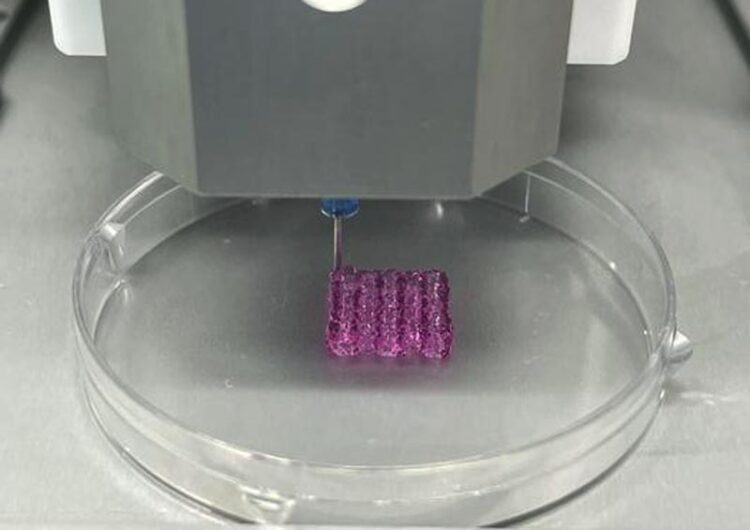3D bioprinting technology to be used for removing cancer cells

Image showing the preparation of hydrogels that enhance the viability of NK cells
Credit: Korea Institute of Machinery and Materials (KIMM)
KIMM develops the world’s first 3D bioprinting technology that enhances the function of NK immune cells. New technology expected to improve effectiveness of cancer treatment.
A three-dimensional (3D) bioprinting technology capable of eliminating cancer cells using the function of immune cells has been developed for the first time in the world.
Through joint research with the Korea Institute of Machinery and Materials (President Sang Jin Park, hereinafter referred to as KIMM), the Korea Research Institute of Bioscience and Biotechnology (President Jang Seong Kim, hereinafter referred to as KRIBB), institute under the jurisdiction of the Ministry of Science and ICT, developed a 3D bioprinting technology using natural killer cells (NK cells)* as a new method of immunotherapy for treating cancer, and announced the outcome of the research on Biomaterials Research (IF: 11. 3)**, a renowned journal.
*NK cell: Natural killer (NK) cell is a leukocyte that responds to the formation of viruses and tumor cells, and selectively kills cells that are harmful to the human body. NK cells remove distressed cells that have been infected internally, rather than viruses that have intruded from the outside.
**Title: NK cells encapsulated in micro/macropore-forming hydrogels via 3D bioprinting for tumor immunotherapy (date of publication: June 22, 2023)
Allowing the 3D-printed hydrogels to encapsulate NK cells helps to prevent the loss of NK cells and enables a majority of those cells to home in on the tumor cells. Pores form in the hydrogel, and NK cells that retain cell viability are released after a certain amount of time, which allows for the performance of immune functions.
Although NK cells are generally used for immunotherapy, the method of injecting NK cells via intravenous injection has not shown effective results in clinical trials on solid tumors*. This is because NK cells are incapable of retaining an appropriate level of viability and fail to target solid tumors.
*Solid tumors: Solid tumors refer to malignant tumors that are composed of vascular and connective tissues and have solidity and form.
On the other hand, by using the newly developed technology, NK cells can be injected into the hydrogel, printed, and then cultured in a 3D environment, which enhances the cell viability and activity of NK cells and enables those cells to confront cancer tissues.
Principal Researcher Su A Park of KIMM was quoted as saying, “This technology can help to significantly improve the functionality of NK cells that are used for cancer treatment. We expect to contribute to the treatment of cancer patients through this newly developed technology.”
This research was carried out with the support of the project for the “Development of multiscale-vasculature-laden skin composite tissue for evaluation of implantable nano-bio-sensors” sponsored by the Ministry of Science and ICT and the National Research Foundation of Korea, and the project for the “development of UnTACT systems for critical illnesses” conducted by the Convergence Research Center of the National Research Council of Science and Technology.
The Korea Institute of Machinery and Materials (KIMM) is a non-profit government-funded research institute under the Ministry of Science and ICT. Since its foundation in 1976, KIMM is contributing to economic growth of the nation by performing R&D on key technologies in machinery and materials, conducting reliability test evaluation, and commercializing the developed products and technologies.
This research was carried out with the support of the project for the “Development of multiscale-vasculature-laden skin composite tissue for evaluation of implantable nano-bio-sensors” sponsored by the Ministry of Science and ICT and the National Research Foundation of Korea, and the project for the “development of UnTACT systems for critical illnesses” conducted by the Convergence Research Center of the National Research Council of Science and Technology.
Journal: Biomaterials Research
DOI: 10.1186/s40824-023-00403-9
Article Title: NK cells encapsulated in micro/macropore-forming hydrogels via 3D bioprinting for tumor immunotherapy
Article Publication Date: 22-Jun-2023
All latest news from the category: Medical Engineering
The development of medical equipment, products and technical procedures is characterized by high research and development costs in a variety of fields related to the study of human medicine.
innovations-report provides informative and stimulating reports and articles on topics ranging from imaging processes, cell and tissue techniques, optical techniques, implants, orthopedic aids, clinical and medical office equipment, dialysis systems and x-ray/radiation monitoring devices to endoscopy, ultrasound, surgical techniques, and dental materials.
Newest articles

Innovative 3D printed scaffolds offer new hope for bone healing
Researchers at the Institute for Bioengineering of Catalonia have developed novel 3D printed PLA-CaP scaffolds that promote blood vessel formation, ensuring better healing and regeneration of bone tissue. Bone is…

The surprising role of gut infection in Alzheimer’s disease
ASU- and Banner Alzheimer’s Institute-led study implicates link between a common virus and the disease, which travels from the gut to the brain and may be a target for antiviral…

Molecular gardening: New enzymes discovered for protein modification pruning
How deubiquitinases USP53 and USP54 cleave long polyubiquitin chains and how the former is linked to liver disease in children. Deubiquitinases (DUBs) are enzymes used by cells to trim protein…



